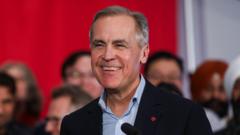As President Trump prepares to impose tariffs on key trade partners this weekend, economists and global markets are on high alert. His proposed tariffs of 25% on Canada and Mexico, and 10% on China, could ignite a trade war that has been looming since his election.
Trump's Proposed Tariffs Stir Global Economic Concerns

Trump's Proposed Tariffs Stir Global Economic Concerns
The impending tariffs signal potential upheaval in international trade relations.
President Trump's recent threats to impose tariffs on major trading partners Canada, Mexico, and China are causing waves in the global economy. With tariffs potentially set to begin this Saturday, international policymakers, economists, and investors are monitoring the situation closely, as it could greatly impact trade dynamics.
The tariffs are framed by Trump as a necessary move to deter the flow of drugs and migrants into the U.S., particularly focusing on fentanyl. However, specific details regarding which imports will bear the burden of these additional taxes remain uncertain. Advisers to the president are reportedly considering whether to apply tariffs broadly across sectors, such as steel and aluminum, or to announce them with a delayed implementation.
In a proactive response, officials from Canada and Mexico have intensified their diplomatic efforts, engaging in urgent discussions with Secretary of State Marco Rubio to persuade the president to reconsider. In a recent statement, Mexican President Claudia Sheinbaum indicated her country's readiness to counter the tariffs effectively, emphasizing the importance of respectful dialogue in their ongoing communications with the U.S.
With both auto and energy sectors voicing strong opposition to the imposition of tariffs, the final decision by Mr. Trump could shift the tides of international cooperation and commerce. The unfolding events this weekend will mark a significant milestone in U.S. trade policy, with repercussions likely to reverberate beyond American borders.
The tariffs are framed by Trump as a necessary move to deter the flow of drugs and migrants into the U.S., particularly focusing on fentanyl. However, specific details regarding which imports will bear the burden of these additional taxes remain uncertain. Advisers to the president are reportedly considering whether to apply tariffs broadly across sectors, such as steel and aluminum, or to announce them with a delayed implementation.
In a proactive response, officials from Canada and Mexico have intensified their diplomatic efforts, engaging in urgent discussions with Secretary of State Marco Rubio to persuade the president to reconsider. In a recent statement, Mexican President Claudia Sheinbaum indicated her country's readiness to counter the tariffs effectively, emphasizing the importance of respectful dialogue in their ongoing communications with the U.S.
With both auto and energy sectors voicing strong opposition to the imposition of tariffs, the final decision by Mr. Trump could shift the tides of international cooperation and commerce. The unfolding events this weekend will mark a significant milestone in U.S. trade policy, with repercussions likely to reverberate beyond American borders.






















